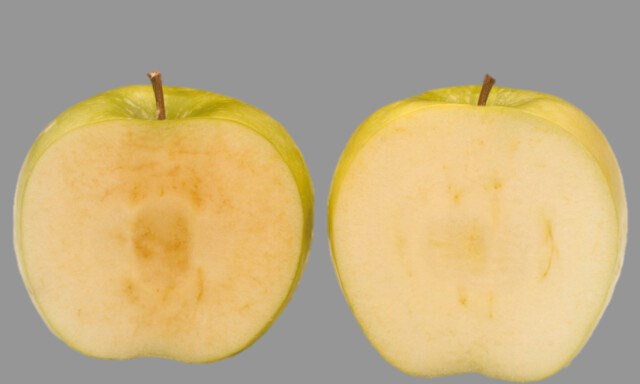An Okanagan-based company is thrilled that their latest trademarked non-browning apple has been green-lit for sale on Canadian shelves, after a history of public nerves surrounding genetically modified crops.
Okanagan Specialty Fruits is the developer and grower behind "Arctic apple" varieties, sold pre-sliced or diced with the promise of staying fresh and avoiding browning for up to 28 days thanks to bioengineering tweaks to the apples' genetic codes.
They announced this week that Canadian regulatory agencies have approved their latest variety, the Arctic Gala, for food use in sa国际传媒, joining three others previously approved.
The company, while based in Summerland, has its orchards in Washington State, growing apples on more than 12,000 acres.
Company cofounder and CEO Neal Carter said that while companies like his own that use genetic engineering to modify crops have a history of controversy due to what he calls a lack of public understanding, he has noticed less of that confusion in recent years — though it still pops up.
"[Bioengineered crops] are everywhere, in terms of the foods we eat," Carter said.
"This technology has been around for 40 years. It's not new. And, you know, the use of molecular biology and genomics is everywhere ... this is really tried and true and proven technology. Hundreds of millions of acres of crops planted, never a health incident, so, it's interesting or a bit frustrating that [concerns are] still out there."
Carter said the company's goal is quality product with a longer shelf life, driving consumption of a healthy product.
"It's well recognized that if you put a bowl of whole apples out, not that many people take one because it's a big commitment. You put sliced apples out and everybody's all over them, you know, they just get consumed," Carter said.
The Arctic apples will be treated no differently, under the eyes of Canadian food authorities, than any other apples, and Carter said they are close to agreements with a few major retailers.
There are no immediate plans to plant Arctic apple trees in the Okanagan, though that opportunity may be offered to local orchardists in the future.
When the Arctic brand first emerged, Southern sa国际传媒 fruit growers on their slice of the market, given nerves about genetically modified products.
While Carter acknowledged that this latest announcement "won't make everybody happy," his position is that change in the industry is inevitable.
"It'll happen at some point, and whether it's us or somebody else, and whether it's apples or some other crop, whether it's gene edited or bioengineered, we're gonna start seeing these crops get deployed," Carter said.
"And I think from a consumer's perspective, it's good. These are crops that have the potential to reduce food waste and improve sustainability and, you know, help our climate and our environment and all the rest. I think it's going to be a big part of the next 25 years in the agricultural business worldwide."
A representative from the BC Tree Fruits Cooperative declined comment, and the BC Fruit Growers' Association was not immediately available for comment.





